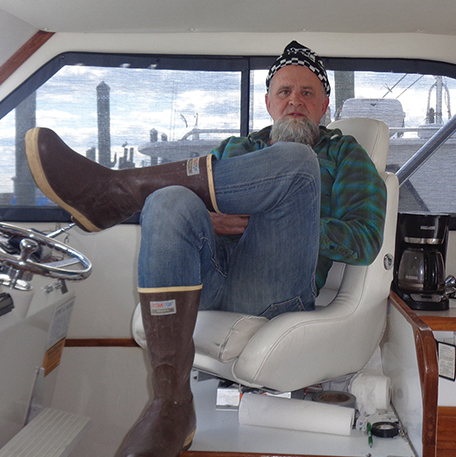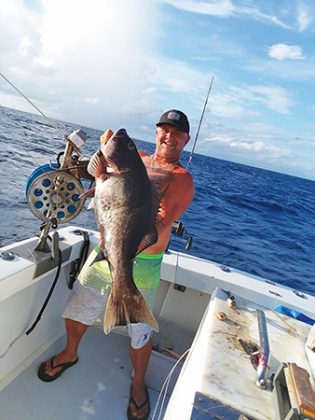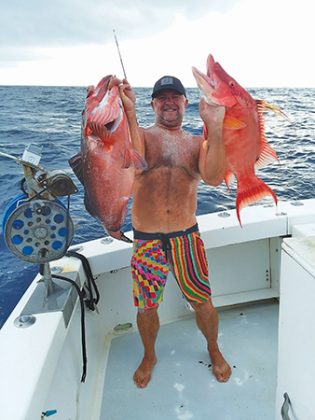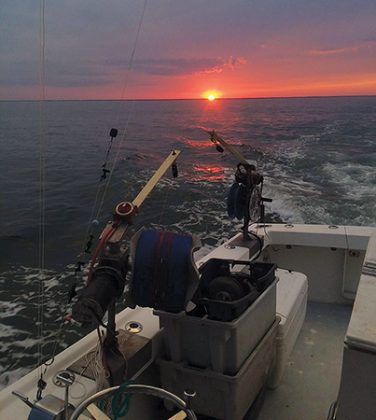
Subscribe to our newsletter
Enter your email address below and subscribe to our newsletter

The day I met Captain Everette “Chimmitt” Silver, he was preparing to leave Murrells Inlet with his crew for four days at sea, working as commercial fishermen, in the 42 foot Judge, Wicked Tuna. Captain Silver took a break from his work, and shared a little about his life at sea from the cozy cabin of the boat. “Everyone calls me Chimmitt,” he told me with a smile, explaining that it was his childhood nickname.

The Wicked Tuna is a comfortable boat, boasting high tech equipment, a well appointed stateroom with a television for the captain and another, smaller stateroom with bunks for the crew. There’s a decently-sized bathroom with a shower and basic cooking facilities with a small refrigerator. The cabin where we talked also has a television and comfortable seats. Most importantly, this boat has the latest safety features to help protect captain and crew from the many things that can go wrong when you are 80 miles offshore – and vulnerable to ever-changing weather (think 50 foot rogue waves), massive cargo ships looming 20 stories above the sea, and inevitable human error.I asked Chimmitt how Murrells Inlet’s commercial fishing fleet had changed through the years and he told me, “Now we have nine boats going out of Murrells Inlet – when I started we had more than 30, we were the largest commercial fishing point on the East Coast.” One of Chimmitt’s first jobs was working as a crew member for Captain Hoss Johnson, one of Murrells Inlet’s legendary sea captains, on the New Inlet Princess, a head boat designed for day fishing trips.
“We’re headed out for a four day trip, if the weather is good we may stay out eight days,” Chimmitt told me as he began to talk about the realities of commercial fishing. “Last trip (also four days) we caught 2500 pounds of fish – vermillion snapper and greater amberjack. We can’t fish for grouper from January 1-May 1.” Regulations determining what fishermen are allowed to catch, and when, are supported by the majority of commercial fishermen, and Chimmitt told me he knows these laws have brought grouper back to our waters in larger numbers.

“This trip we’re going about 80 miles offshore,” Chimmitt continued. “Most of the time we fish on the continental shelf, which is about 50-60 miles out.” The captain then explained how the huge reels on the back of the boat worked, the largest used for ball fishing, a difficult way of fishing requiring all hands to execute, but brings in a lot of fish. The success or failure of the trip depends entirely on the skill of the captain – he must know where to fish, when to move and which fishing style to use in each situation. And if they don’t catch fish, no one gets paid. Chimmitt has battled many nor’easters, gales and tropical storms – in one nor’easter off of our coast, he was forced to hold the boat on course, alone, for 17 hours straight, only to end up six miles back from the direction he was heading – but he and his two young, inexperienced crew members lived to fish another day, a testament to the expertise of the captain.
“We just say our prayers and go to sleep,” Chimmitt told me frankly, when I asked him if they stand watch at night. “We’re anchored and leave the anchor light on – legally we have the right of way. But, more and more 1,000 footers [cargo ships] are out there, and it’s easy for them to miss us.” The captain then told me a couple of stories of what can happen on the open sea.

“The Still Crazy 1, captained by a friend of mine, was hit by a ship off of North Myrtle Beach,” he began. “It was February, freezing, blowing a gale with 15 foot seas. They were asleep and the ship hit them. When they ran up to see what had happened, the entire back of the ship was gone – the ship had cut the boat in half.” With a faraway look in his eyes, Chimmitt said the crew had only a minute or so to get in the life rafts. They made it, but couldn’t reach the emergency beacon. Luckily, the beacons are now equipped to go off automatically if they hit the water. “The Coast Guard was notified and sent out a ‘pan pan’ to every boat nearby, a signal that a boat is in distress. A large ship found them, but because of the weather couldn’t get them in the boat. The guys were actually sucked under the ship while it was trying to rescue them, which my buddy said shot them out like a tube of toothpaste, breaking his ribs.” By this time, I’m on the edge of my seat, but luckily, there’s a happy ending. A Coast Guard helicopter finally came, tried to get the shipwrecked crew, but one of them shot a flare, trying to help their rescuers see better. Unfortunately, it blinded the helicopter crew who were wearing infrared glasses, and by the time they recovered, they were low on fuel and had to abort the mission. Finally, after flying to Myrtle Beach and refueling, they were able to bring the stranded fishermen to safety.
Another captain friend of Chimmett’s was fishing off of Frying Pan Shoals, which is also known as the Graveyard of the Atlantic, when a gale began to blow, and a 50 foot rogue wave came out of nowhere, flipping the boat upside down. The crew was knocked unconscious, but two of the three crew members regained consciousness below deck where they were sleeping, and fortunately they were in an air pocket, and able to help themselves. “One guy was able to get to the life raft, but the shock caused him to have a heart attack, and the other got in an emergency suit” Tragically, the other crew member was above deck when the accident happened and went down with the ship, which quickly sank. The two survivors were found by a Lithuanian ship that was off course due to the storm. “They pulled up the one guy who’d had a heart attack in the life raft, but they had to pull the guy in the suit up with a rope around his chest. He had gotten way too much water in his suit putting it on and the weight caused his ribs to break, but he survived.”
Chimmitt continued telling me stories of near misses and tragedies, making me wonder why in the world anyone would want to do this job. “It’s all I’ve ever done,” he began. “It’s a lifestyle. I work 180-200 days a year and have time off when I get back.” When Chimmitt is on shore, he spends most of his time with his 19 year old son, Charlie and 11 year old daughter, Cape. “Charlie is either going to Clemson or USC,” Chimmitt said proudly. “Right now, he’s leaning toward Clemson.”
Fishing has taken Chimmitt around the world – he has worked in South America, Alaska and up and down the Gulf coast. He’s also lived in Hawaii, but didn’t fish commercially there. Once, he even captained a multi-million dollar yacht in the Bahamas. He has also dived for fish – shooting hog snapper and grouper 150 feet below the surface. “I was stung by a lion fish once,” he told me with a laugh. “It stings like you can’t imagine for two and a half hours!”
“I owned my own boat before I started working for Wicked Tuna,” Chimmitt told me. “Now it’s nearly impossible for a small commercial fisherman to own and operate his own boat because of the cost of permits, new regulations and the sometimes limited availability of fish.” Wicked Tuna, the restaurant, uses some of the fish Chimmitt brings in for the restaurant, nearly all of it in the busy season. “They sell what they can’t use.” Continuing, he said, “We all do everything we can to abide by the regulations and keep this a sustainable fishery.”
“I’m clean and sober now,” Chimmitt began, addressing the drug and alcohol problems that plague his industry. “It’s a feat to be in the fishing business and not drink and do drugs, but I did it,” he told me. “I live in a houseboat on the Waccamaw River – it’s so peaceful, there’s no one back there, except the otters, gators and owls. I also love to surf when I can and that keeps me grounded.”
“I’ll work the rest of my life,” Chimmitt told me when I asked if he ever considered retirement. “My ultimate goal is to do a little hand line fishing off of Nicaragua for my retirement job.” Right now, Captain Silver is healthy and able to work hard, but he knows this could change. “This work is hard on your body – there are not a lot of us anymore. I’m going to stick it out for as long as I can – get my kids through college.”
Stop by Wicked Tuna where Captain Silver’s photo hangs in the restaurant. And, please, support our hardworking fishermen by buying local seafood!